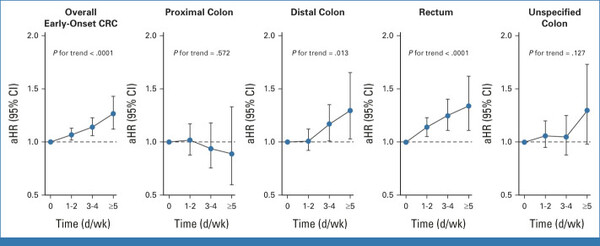A team of researchers at Seoul National University Bundang Hospital (SNUBH) revealed that the risk of early-onset colorectal cancer (CRC) increased by 9 percent for moderate drinkers and by 20 percent for heavy drinkers.

The team of researchers led by Professors Shin Cheol-min and Jin Eun-Hyo of the Department of Gastroenterology at SNUBH and Professor Han Kyung-do of Statistics and Actuarial Science at Soongsil University investigated 5,666,576 adults between the ages of 20 and 49 who underwent a medical examination in 2009 for up to 10 years.
In general, colorectal cancer is more common in people over the age of 50, but the incidence of early-onset CRC has been increasing significantly around the world. In particular, the incidence of colorectal cancer in adults aged 20 to 49 in Korea is 12.9 per 100,000 people, ranking first among the 42 countries surveyed, and the fastest rate of increase.
Most early-onset CRC are caused by environmental factors such as dietary habits, obesity, smoking, and alcohol consumption, and excessive alcohol consumption is known to increase the risk of CRC, incidence, and mortality of all cancers.
Accordingly, the researchers analyzed whether there was a difference in the incidence of CRC in young adults based on the amount of alcohol consumed at the time of screening in 2009 and the frequency of drinking until 2019.
The results showed that a total of 8,314 colorectal cancer cases occurred in adults under the age of 50, with a significantly higher risk of developing the disease in moderate drinkers and heavy drinkers compared to light drinkers. Moderate drinkers were classified as men who consumed 1-3 drinks per day and women who drank 1-2 drinks per day, while heavy drinkers were classified as men who drank 3 or more drinks per day and women consuming 2 or more drinks per day and light drinkers were men and women who consumed less than one drink per day.
Consequently, the risk of early-onset CRC was 7, 14, and 27 percent higher for those who drank 1-2, 3-4, and 5 days or more per week compared with nondrinkers respectively.

Interestingly, the researchers also found that the risk of CRC increased for left-sided colon and rectal cancers based on the amount and frequency of alcohol consumption, while no significant association was found for right-sided colon cancer.
"This is the first large-scale epidemiologic study to analyze the impact of alcohol consumption as a risk factor for colorectal cancer in young people, which has been increasing rapidly in recent years," said Professor Shin. "The fact that the risk of colorectal cancer from alcohol consumption varies depending on the location of the CRC and that women had a similar risk of colorectal cancer as men despite a lower alcohol consumption provide important evidence for understanding the mechanisms of colorectal cancer development and explaining the assosciated risks."
Shin added that it is important to recognize that excessive alcohol consumption may be a contributing factor to CRC and encouraged younger age groups to seek medical attention if unusual symptoms occur.
The findings were recently published in the online edition of the Journal of Clinical Oncology.
Related articles
- 'Digital devices help boost immunity after influenza vaccination'
- SNUBH confirms world's 1st genotype-specific prognosis of female patients with Alport syndrome
- SNUBH, UEMC use AI to improve accuracy, reduce cost of stent procedures
- Asia-Pacific reps call for consensus to improve obesity outcomes
- SNUBH, Kai Health secure ₩1.6 billion for AI-driven IVF embryo selection research
- [Column] Is stage 4 colon cancer inoperable?

